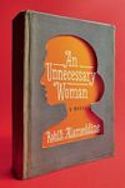 William Alexander Percy: The Curious Life of a Mississippi Planter and Sexual Freethinker
William Alexander Percy: The Curious Life of a Mississippi Planter and Sexual Freethinker
by Benjamin E. Wise
University of North Carolina Press. 355 pages, $35.
MY UNCLE WILL (1885–1941) is introduced as “queer” in a blurb for this fascinating book about him. He was indeed as odd and self-contradictory as that word implies: a sissy-boy who was a hero in World War I (receiving the Croix de Guerre); a lawyer and a poet; a white supremacist in some people’s eyes and a “nigger lover” in others’. Will’s father LeRoy—hunter, gambler, lawyer, planter, capitalist, senator—labeled his frail, prudish Catholic son “a queer chicken.” Coming from Greenville, Mississippi, which lies at the center of the Delta, the patriarch wanted a “real man” as his heir, not the effete, scholarly introvert that he got.
Wise justly praises Will for his four volumes of Uranian poetry (published by Yale University Press). However, he downplays Will’s editorship of Yale’s Younger Poets Series from 1925 to 1932, which was the first of its kind in the U.S., later edited by W. H. Auden.
Although he always had close lady friends, Will never married, a fact no biographer can overlook. Nor is it really possible these days to ignore the homosexual elements in Will’s classic autobiography, Lanterns on the Levee (1941), which became a bestseller, appearing as it did in the wake of Gone With The Wind. To the knowing modern ear, Lanterns comes across as the effusions of a grand old queen coming out to other gays and gambling—successfully—that the straight people reading his book wouldn’t crack the code. Long before that, a poem of Will’s had appeared, slightly altered from the original and attributed to “A. W. Percy,” in a far riskier volume, the anthology Men and Boys (1922). As the title implies, it focused on intergenerational male relationships, which were no more strongly condemned at this time than were same-sex relations between adults, and were often considered more tasteful.
It was one of several straws in the wind. Another was Will’s visits to Taormina, Sicily, where Baron Wilhelm von Gloeden photographed nude Italian boys, often prepubescent boys who were sometimes available sexually for special clients. Even more provocative to contemporary sensibilities is Will’s companion in Italy, the notoriously pedophilic Scottish novelist Norman Douglas. In New York, Douglas’ circle included the dean of Columbia Law School, with whom he shared a summer home, and the pederastic psychoanalyst Harry Stack Sullivan.
As if all this were not sufficiently controversial, Will’s chairmanship of the Red Cross Relief Committee during the Great Flood of 1927 would lead to allegations in which dangerous eddies of race and sex swirl into each other. Wise repeatedly describes the Percys as paternalistic white supremacists. But almost everyone was a racist at this time, before Hitler’s extremism and Eleanor Roosevelt’s liberalism began to discredit racism. Far from taking a merely condescending view of black culture, Will engaged with it seriously, notably through friendships with Harlem Renaissance types, particularly the gay African-American poet Langston Hughes.
Wise trivializes many hours of taped interviews that attest to Will’s sexual relationships with black teenagers, dismissing the words of their surviving close associates in John M. Barry’s Rising Tide (1997) as merely “some anecdotal evidence.” And here’s the thing: those “servants” had all been around twelve or thirteen when Will first had sex with them—successively, Ernest, Fode, and Honey—a detail that Wise totally obscures. A key witness, Millie Commodore, the wife of Fode’s best friend and daughter of the blacks’ strike leader against compulsory labor during the flood, saw these liaisons as benign opportunities for boys’ education and jobs. Far from being cowed by their patron’s power, they flaunted their own. Honey publicly bragged that Will was his whore.
What a tale, if only Wise had taken the bull by the horns!





